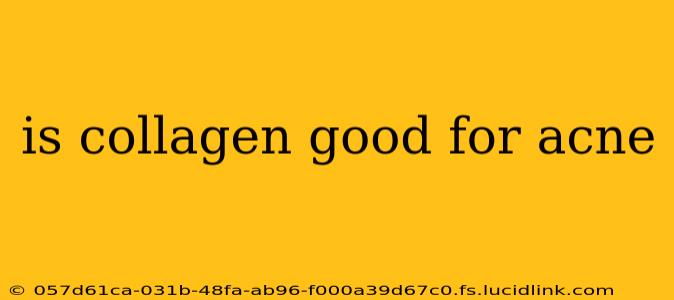Acne, a common skin condition affecting millions, is characterized by blemishes, pimples, and inflammation. While the quest for clear skin often leads to exploring various treatments, collagen's role in acne remains a point of discussion. This article will delve into the science behind collagen and its potential effects on acne, addressing common questions and misconceptions.
Does Collagen Cause Acne Breakouts?
This is a frequently asked question, and the answer is nuanced. Collagen itself doesn't directly cause acne breakouts. Acne is primarily triggered by a combination of factors, including excess sebum production, clogged pores, bacteria, and inflammation. However, the type of collagen supplement and its delivery method might indirectly influence acne. Some individuals report breakouts after starting collagen supplements, potentially due to ingredients other than collagen in the supplement formulation, such as added sugars or preservatives. These additives can inflame the skin, exacerbating existing acne or triggering new breakouts.
Can Collagen Help Improve Acne Scars?
This is where collagen shows more promise. Acne scars result from the body's wound-healing process after a pimple or blemish. Collagen plays a crucial role in skin repair and regeneration. While collagen supplements might not erase scars completely, they can contribute to improved skin elasticity and texture, potentially making scars less noticeable over time. This effect is more likely to be seen with topical collagen application or treatments that stimulate collagen production within the skin, such as microneedling or laser therapy.
What are the benefits of collagen for skin health in general?
Collagen is a vital structural protein that provides skin with its firmness, elasticity, and hydration. As we age, collagen production naturally declines, leading to wrinkles, sagging skin, and dryness. While this doesn't directly address active acne, healthy skin is less prone to inflammation and breakouts. Supplementing with collagen may help improve overall skin health, potentially contributing to a less acne-prone complexion in the long run. However, it's important to remember that collagen supplements are not a cure for acne.
Does collagen help reduce acne inflammation?
There's limited direct evidence suggesting collagen supplements significantly reduce acne inflammation. While collagen is involved in tissue repair, the inflammatory processes in acne are complex and influenced by hormones, genetics, and bacteria. Topical treatments directly targeting inflammation, such as retinoids or benzoyl peroxide, are generally more effective for reducing acne inflammation.
What are the best types of collagen for skin?
Several types of collagen exist, each with varying benefits. Type I and III collagen are most abundant in the skin and are often found in supplements marketed for skin health. However, research on the specific effectiveness of different collagen types for acne is still limited. Choosing a high-quality supplement from a reputable brand is crucial to ensure purity and effectiveness. Always check the ingredient list to avoid potential irritants.
Conclusion: Collagen and Acne – A Balanced Perspective
Collagen's role in acne is complex and not fully understood. While it doesn't directly treat acne, it may indirectly benefit skin health by promoting improved elasticity and texture, potentially reducing the appearance of acne scars. However, collagen supplements are not a replacement for proven acne treatments. For active acne, consulting a dermatologist for tailored advice and treatment is crucial. Collagen can be considered a supportive addition to a comprehensive skincare routine focused on overall skin health, but it shouldn't be the sole solution for managing acne.
